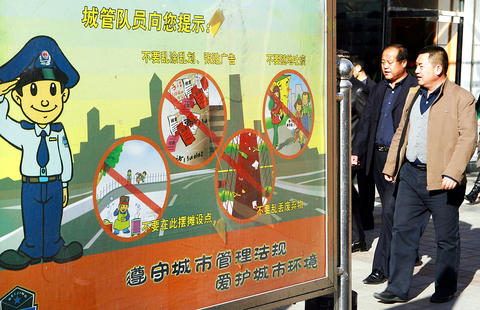As bicycle attendant Guo Guiyou stands guard outside a busy Beijing railway station, he suddenly makes a loud coarse noise as he opens his mouth and propels a gobbet of spit on to the pavement.
"It's good to spit, it's good for your health," said the 40-year-old man unapologetically as he rubs his shoe over the foul puddle he has just created.
Although there is now a wide consensus that spitting is "uncivilized" behavior, as pre-Olympics manners campaigns term it, spitting is still pretty much a trademark sight and sound across the country.

Even though the government has stepped up punishment for spitting, a possible fine of 50 renminbi (US$7) does not deter Guo.
"That's okay - most of the time, they don't see you," he said.
Few who visit China can help but notice the frequency of spitting in public, which often follows a irritatingly gravelly clearing of the throat and lungs, and a complete lack of embarrassment about the habit.
Late paramount leader Deng Xiaoping (鄧小平) was a known to be an enthusiastic spitter who proudly kept a spittoon close by when he greeted foreign dignitaries at the Great Hall of the People in the 1970s and 1980s.
Although the practice spreads diseases that are rife in China, it is still common on the roads and alleys of the Chinese capital to have to dodge disgusting blobs of saliva - especially in winter when they freeze and become hazardous to pedestrians and cyclists alike.
But to many Chinese, spitting is a physical phenomenon as natural as sneezing or belching, and is traditionally nothing to be ashamed of.
"Well, I can't spit inside my car, can I?" said taxi driver Sui Ningguo, as he wound down the window and propelled his phlegm outwards. "No one cares about spitting anyway."
Medical experts say phlegm is generated normally when one is suffering from respiratory infections, but it is also produced when the lungs are irritated by pollution and habits such as smoking and eating heavy, oily food.
Li Yan, a respiratory disease expert at Beijing's Xuanwu Hospital, believes widespread respiratory infections, partly due to China's polluted environment, and the population's lack of hygiene awareness contribute to the habit.
"Dry climate in many Chinese cities, coupled with bad air quality, also lead to the build-up of mucus in one's respiratory tract, hence generating phlegm," she said.
She said air-borne respiratory diseases such as tuberculosis, pneumonia and influenza can be spread by the phlegm of a disease carrier.
Doctors say the urge to spit is probably more to do with the commonly perceived concept in China that one should spit whenever one feels a throat irritation.
"A lot of it is just bad habit. Some people spit even when there is no phlegm and what they spit out is in fact saliva," said Wang Jidong, professor at the Beijing Chinese Medicine University.
"But saliva is part of your normal secretion and aids digestion. It's just a wrong idea that people have."
Earlier this year, officials admitted that getting the capital's residents to bring their manners up to international standard in time for the Olympics next August could be a bigger task than constructing the new sports venues.
Zhang Faqiang, vice head of the Beijing Olympic organizing committee, said the most difficult area in staging a "civilized" Olympics" rests in "the quality of the people"
But some ordinary Beijing residents say they really do not care.
"As an individual, I can't care too much about the country's affairs. To be honest, who cares?" said Guo, the bicycle attendant.

April 28 to May 4 During the Japanese colonial era, a city’s “first” high school typically served Japanese students, while Taiwanese attended the “second” high school. Only in Taichung was this reversed. That’s because when Taichung First High School opened its doors on May 1, 1915 to serve Taiwanese students who were previously barred from secondary education, it was the only high school in town. Former principal Hideo Azukisawa threatened to quit when the government in 1922 attempted to transfer the “first” designation to a new local high school for Japanese students, leading to this unusual situation. Prior to the Taichung First

The Ministry of Education last month proposed a nationwide ban on mobile devices in schools, aiming to curb concerns over student phone addiction. Under the revised regulation, which will take effect in August, teachers and schools will be required to collect mobile devices — including phones, laptops and wearables devices — for safekeeping during school hours, unless they are being used for educational purposes. For Chang Fong-ching (張鳳琴), the ban will have a positive impact. “It’s a good move,” says the professor in the department of

On April 17, Chinese Nationalist Party (KMT) Chairman Eric Chu (朱立倫) launched a bold campaign to revive and revitalize the KMT base by calling for an impromptu rally at the Taipei prosecutor’s offices to protest recent arrests of KMT recall campaigners over allegations of forgery and fraud involving signatures of dead voters. The protest had no time to apply for permits and was illegal, but that played into the sense of opposition grievance at alleged weaponization of the judiciary by the Democratic Progressive Party (DPP) to “annihilate” the opposition parties. Blamed for faltering recall campaigns and faced with a KMT chair

Article 2 of the Additional Articles of the Constitution of the Republic of China (中華民國憲法增修條文) stipulates that upon a vote of no confidence in the premier, the president can dissolve the legislature within 10 days. If the legislature is dissolved, a new legislative election must be held within 60 days, and the legislators’ terms will then be reckoned from that election. Two weeks ago Taipei Mayor Chiang Wan-an (蔣萬安) of the Chinese Nationalist Party (KMT) proposed that the legislature hold a vote of no confidence in the premier and dare the president to dissolve the legislature. The legislature is currently controlled